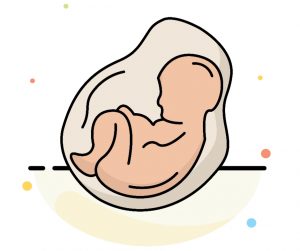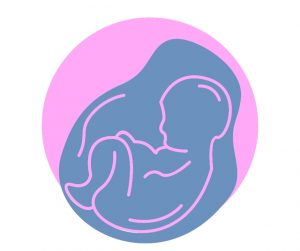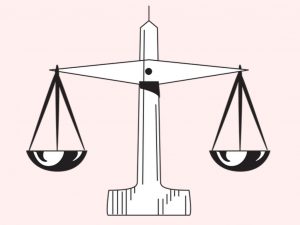Is Abortion Legal in Nigeria? An act is said to be legal f it is authorized or justified or excused by law. This key definition of legality covers both acts which are expressly lawful and those which ordinarily or generally are not lawful but under certain circumstances is justified and excused by law (that is, exceptions to general principles). It follows that any act or omission which is not expressly incriminated by law is legal.

The law is not concerned with that which is morally right or wrong, although there exist some sort of relationship between morality and legality. The law is rather squarely concerned with that which is legal or illegal.
Recommended: Punishment for Stealing in Nigeria 2022
What Is Abortion?
Abortion is the expulsion of a foetus or embryo from the womb before it is fully developed. For a layman definition, abortion is the destruction (killing) and removal of a developing baby before it is fully developed and severed from its mother’s womb through birth.

Divergent Views On Abortion
Abortion is an act of immemorial antiquity. The act has been in existence from long history and majority of customs and traditions are against the practice. The abhorrence of abortion is a notorious one and in fact has become expressly encoded, prohibited and punishable by the principal laws of the states. The prevalent opposing view is that abortion is an act against humanity, and that that act is tantamount to homicide.
The justification of this view is based on humanity and morality. It is said that humans have been provided with all available contraceptives to prevent the occurrence of pregnancy so that when pregnancy occurs by any chance, one should take up the responsibility. Moreso, that the expulsion of foetus from the womb is an act injurious to humanity since a foetus is a full fledge existing life undergoing development. Religion, morality, humanity and legality therefore have remained on the same page at maintaining a ban against abortion in Nigeria.

Recommended: How to Sue Someone in Another Country
Recently, an uprising proposing vies is supported by the fact that since women are autonomous beings, and that since the women’s body singly bears the burden of pregnancy, child bearing and raising, they should be at liberty to decide what goes on within their body. This view is also supported by the fact that prohibition of abortion causes more harm than good; the reasons being that, one, it does not actually deter the commission of abortion.
Bearing an unwanted pregnancy is such a het up condition that any victim would readily opt in for any means whatsoever that is likely to expel the foetus. This includes hard measures that may eventually head to a miscarriage.
Therefore, criminalization of abortion rather than deter people from committing abortion, pushes them into employing unsafe means of abortion which could eventually lead to death. It is for the same view that the performance of abortion ordinarily should be safer if legalized. Moreso, that criminalization of abortion asides the resort to unsafe measures, has rendered even the unsafe measures unaffordable.

Recommended: Countries Where Abortion is Legal 2022
The Illegality of Abortion in Nigeria
The question as to whether abortion is legal in Nigeria is answered in the genitive. Abortion is not legal in Nigeria. The procurement, inducement and performance of abortion are expressly prohibited in Nigeria by the principal penal laws. That is to say; the pregnant woman whose pregnancy is terminated, the doctor who performs or administers the medication for abortion, any person who supplies the medication for abortion and any person who procures or encourages abortion are all criminally liable for the offence of abortion, although the degree of their liability differs.
Abortion under the Nigerian Criminal Code Act is categorized as an offence against morality. Section 228 of the said Act makes it an offence to attempt to procure abortion. The section provides that any person who having the requisite intent, procures the miscarriage of a woman, administers or causes her to take any substance or use force or nay means whatsoever for the same end, whether or not the woman it with a child, it guilty of a felony punishable with 14 years imprisonment.

Recommended: Richest Men in South Africa and their Networth 2022
From the provision of the section it is seen that the law is not interested in whether the end purpose which is abortion was actually attained eventually. The section makes one liable as long as there exist the requisite intent to procure the miscarriage of a woman whether or not she is pregnant at the relevant time.
The import if this section is a clear one; one can actually be held liable for procuring miscarriage of a woman who is not pregnant, although the fact not known to him. It is therefore not a defence that the woman in question was not pregnant or could not have possibly been pregnant at the relevant time, as long as the original intent was to induce miscarriage. The provision of this section seems to be targeted on people, who may as proactive measure takes an abortifacient where there is uncertainty or expectancy of an already occurred pregnancy.
Once may argue that the provision of this section is far stretched, however, it seems to be justifiable. This is because, there already exist the physical and mental element, and it is the law that factual impossibility (the fact that an offence could not possibly be committed in a given circumstance not known to the accused) does not avail a defence to the accused. Moreso, section 228 of the Criminal Code Act deals with attempt to procure miscarriage. Attempt is an inchoate offence; it need not have been fully executed before liability arises.
Recommended: Newest Countries in the World 2022
Liability of doctors, health specialists ad any person whomsoever who induces abortion is covered under section 228. Another relevant section incriminating abortion under the Nigerian Criminal Code Act is section 229. The section punishes a woman who procures her own miscarriage and also covers the attempt to procure own miscarriage. Under this section, where a woman whether or not she is with a child, procures her own miscarriage, administers substance to herself by any means whatsoever, or permits another to administer such to her is guilty of a felony punishable with 7yeas imprisonment.
Going further, section 230 of the Criminal Code Act incriminates the act of supplying drugs or instruments to procure abortion by any person with the intent that it be used to procure a woman’s miscarriage or with the knowledge that it is to be used to procure a woman’s miscarriage, whether or not the woman is with a child. The punishment prescribed under this section is 3 years imprisonment, and the accused can only be arrested with a warrant. Under this section, the drugs so supplied need not to have been administered. All that is required for liability is that the accused supplied drugs with the intent to foster abortion or with the knowledge of its intended use for abortion.
Recommended: How To Write a Memo (with examples)
Is There Any Exception Where Abortion is Excused By Law?
From the relevant provision of the Act, it seems that there are circumstances where abortion may be permissible in Nigeria. These are circumstances where expulsion of foetus from the mother’s womb is necessary for the preservation of the mother’s life. Therefore, where the pregnancy poses danger to the mother’s life, it is excusable for abortion to be performed.
This however must be performed in good faith. The relevant section is section 297 of the Criminal Code Act. Abortion may also be excused where the foetus is a product of rape or incest. This although not expressly or impliedly provided by Nigerian law, is obtainable in some countries such as UK.
Recommended: Differences Between Passive Income and Active Income
Illegality OF Abortion Under The Penal Code Act
The Penal Code Act is the applicable code in the Northern Nigeria. Section 232 of the Penal Code Act provides that except for the purpose of saving the mother’s life in good faith, abortion is punishable with imprisonment which may extend to 14 years or fine or both.
Section 233 of the Penal Code Act further provides that causing of the death of a woman in the process of abortion whether or not she is with a child is punishable with 14 years imprisonment and fine. Where the act was done with the woman’s consent, it is punishable with life imprisonment or less and a fine.
Section 234 of the Penal Code Act the act where one exerts force on a woman and thereby unintentionally causes her miscarriage with imprisonment which may extend to 3 years or fine or both. Where the offender has the knowledge of the fact that the woman is pregnant, it is punishable with imprisonment which may extend to 5 years or fine or both.
Recommended: Oldest Countries In The World by Age
Conclusion
It is a settled la that abortion is a crime in Nigeria. The act is punishable by both the Criminal Code Act and the Penal Code Act. There have been recent agitations proffering reasons why abortion should be legitimized in Nigeria. Asides the exception excused by the law, it seems that the possibility of legalizing abortion in Nigeria is not yet in view.

Edeh Samuel Chukwuemeka, ACMC, is a lawyer and a certified mediator/conciliator in Nigeria. He is also a developer with knowledge in various programming languages. Samuel is determined to leverage his skills in technology, SEO, and legal practice to revolutionize the legal profession worldwide by creating web and mobile applications that simplify legal research. Sam is also passionate about educating and providing valuable information to people.